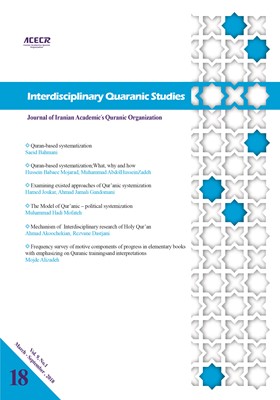Quran-based systematization; What, why and how
Subject Areas :Hussein Babaee Mojarad 1 , Mohammad AbdolHusseinZadeh 2
1 -
2 -
Keywords: Qur’anic making system sources making system basis of making system issues of making system Credits,
Abstract :
Systemization in common language and sometimes in scientific discourse have spiritual common meaning for four proof of “system logy” (in genesis field), “finding system” (in legislation field), “making system” (in credits field) and “stablishing system” (in objective field). Although, in particular, “making system” is observing credits and social contracts which, is establish in any sub-system. Hence, the author believed that “making system” with its general meaning is contain all four fields and Holy Qur’an, as a religious epistemology source, is in all four field. According to this, each field is acquired to that field. Furthermore, if the process of “making system” became ignored or did not based on Qur’an principles then the process of solving problems and system’s challenges won’t base on monotheistic realism and idealism. Therefore, different social sub-systems would become panacea for delusive or non-priority issues, imposition and oriented toward non-Islamic ideals. This deviation from religious trusted sources, on one hand, would failed Islamic system in establishing its material and spiritual purposes, which, this would have doubted elites and people of the system through revolutionary identity of Islamic system. And on other hand, this would lead to establishment of social sub-system, autocracy (though small), arrogance (though in a small part) and establishment of secular governance (though smoothly but theorized). The process of “making system” is making credit in form of moving from origin to matters (having brief knowledge through recognizing the basis and giving priority to matters), and moving from matters toward sources (for re-reading) and reforming (re-defining), origins (having lasting knowledge through origins) and finally moving from origins to matters for defining, explaining, sensing and solving problems. Although, must bear in mind that in this movement, which, is detailed and brevity, having inner flexibility for reformation, moving gradually toward evolution is continuation for making system.
قرآن كريم (1390). ترجمه آيت ا... ناصر مكارم شيرازي . بيروت: مركز نشر جمهوری اسلامیايران.
جعفري، يعقوب (بي تا). تفسير كوثر. بي جا: بي نا.
نهج البلاغه.
ابن منظور، محمد بن مکرم ( 1407ق). لسان العرب. جلد دوازدهم، بیروت: انتشارات دار صدر.
ازهری، محمد بن احمد (1412ق). تهذیب اللغة. جلد چهاردهم، بیروت: انتشارات دار احیاء التراث العربی.
بهجتپور، عبدالکریم (1392). تفسیر تنزیلی (به ترتیب نزول)،تهران: انتشارات پژوهشگاه فرهنگ و اندیشه اسلامی.
جوهری، اسماعیل بن حماد (1426ق). الصحاح. جلد پنجم، بیروت: انتشارات دارالعلم للملایین.
رضائیان، علی (1384). تجزيه وتحليل وطراحي سيستم. تهران: انتشارات سمت.
ریتزر، جورج (1374). نظریههای جامعهشناسی دوران معاصر. ترجمه محسن ثلاثی. تهران: انتشارات علمی.
سعدی، حسینعلی (1392). فقه مضاف. قم: سخنرانی در همایش فقه حکومتی نظام ساز.
صاحب بن عباد و اسماعیل بن عباد (1422ق). المحیط فی اللغة، جلد دهم، بیروت: انتشارات عالم الکتاب.
صدر، سید محمد باقر (1375). بحوث في علم الاصول. ترجمه سيد محمودهاشمي شاهرودي، نشرالمجمع العلمي للشهيد الصدر.
صدر، سید محمد باقر (1379). المدرسة القرآنیة. قم: نشرالمجمع العلمي للشهيد الصدر.
صدر، سید محمد باقر (1382). اقتصادنا (کتاب الثانی). قم: نشرالمجمع العلمي للشهيد الصدر.
صدر، سید محمد باقر (1390). موسوعة الشهید الصدر. قم: نشرالمجمع العلمي للشهيد الصدر.
صدر، سيد محمدباقر (1370). اقتصادما یا بررسیهایی در مکتب اقتصادی اسلام. ترجمه: محمد کاظم موسوی.
طباطبایی، سید محمد حسین (1374). المیزان فی تفسیر القرآن. ترجمه محمدباقر موسوی همدانی. قم: دفتر انتشارات اسلامی.
طباطبایی، محمد حسين (1390). اصول فلسفه و روش رئالیسم. مقدمه و پاورقي به قلم: مرتضي مطهري، ج2، تهران: انتشارات صدرا.
طریحی، فخر الدین بن محمد (1375). مجمع البحرین. جلد ششم. تهران: انتشارات مرتضوی.
فراهیدی، خلیل ابن احمد (1415ق). کتاب العین. جلد هشتم. قم: انتشارات نشر هجرت.
کعبی، عباس (1392). نظامسازی از منظر حقوق عمومی. سخنرانی در همایش نظامسازی انقلاب اسلامی از منظر حقوق عمومی. قم: همایش نظامسازی انقلاب اسلامی از منظر حقوق عمومی.
مطهری، مرتضی (1381). مجموعه آثار. تهران، انتشارات صدرا.
میرباقری، سید محمد مهدی (1391). جلسات درس خارج فقه حکومتی. سایت فرهنگستان علوم قم www.isaq.ir.
نقی پورفر، ولی الله (1383). اصول مدیریت اسلامی و الگوهای آن (نسخه 24). تهران: مرکز مطالعات و تحقیقات مدیریت اسلامی.
واسطی، عبدالحمید (1388). نگرش سیستمی به دین. مشهد: موسسه مطالعات راهبردی علوم و معارف اسلام.
هادوی تهرانی، محمدمهدی (1377). نظریه اندیشه مدون. فصلنامه قبسات، 7(11)، 98-108. Ackoff, R. L. (2000). From mechanistic to social systemic thinking. Cambridge, MA: Pegasus Communications Inc.
Ashby, R. (1960.). Stability and adaptation. Organizations: Systems, Control and Adaptation, 2. / [a Cura Di] Joseph A. Litterer.
Ball, R. A. (1978). Sociology and General Systems Theory. The American Sociologist, 13, 1, 65-72.
Dahl, R. A. (1994). A Democratic Dilemma: System Effectiveness versus Citizen Participation. Political Science Quarterly, 109, 1, 23-34.
Parsons, Talcott. (1951). The Social System. Glencoe, Illinois: Free Press.
Radcliffe – Brown, A. R. (1952). Structure and Function in Primitive Society. New York: Free Press. www.khamenei.ir


